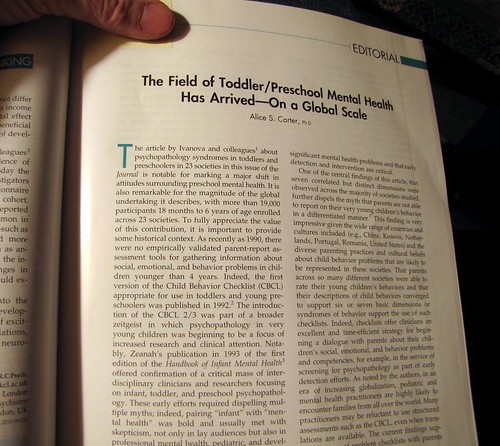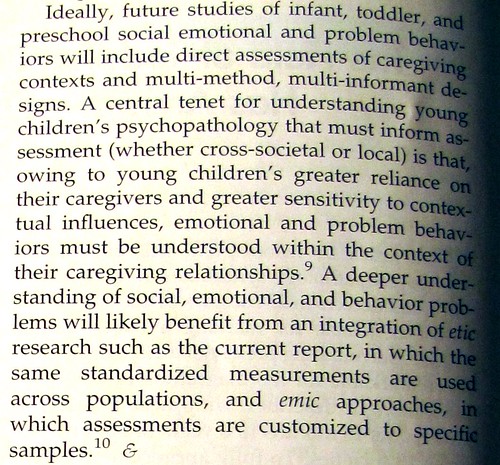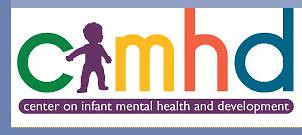The experience of providing INFANT and EARLY CHILDHOOD MENTAL HEALTH consultation, from the perspective of providers on the Kitsap and Olympic peninsulas of Washington State
Monday, February 28, 2011
On the Brain is Shaped By Experience: And the most powerful experiences are relationships
Tuesday, February 22, 2011
On Everybody Looks Forward to Fridays: Because they feel appreciated, taken care of, and important
When the Infant Mental Health (IMH) Specialist walks into the playroom, she sees Karina and her mother Karen. Six-month-old Karina sits in her infant seat on the table and Karen sits in a chair. They both face the door. Karen reads a magazine as Karina gazes at the side of her face. The IMH Specialist softly says, “Karina, is Karen the prettiest mommy you’ve ever seen?” Karen looks up and smiles at the IMH Specialist. The IMH Specialist then says, “Did you see how lovingly Karina was looking at you?” Karen laughs and tickles Karina’s belly, saying, “You’re such a silly baby!” Karina and her mother exchange sounds and giggles as the IMH Specialist looks on. The home visitors happily chat over the complimentary breakfast that the agency provides for their meeting every Friday morning. They are also getting ready for their meeting with the Mental Health Consultant (MHC). Every Friday the MHC meets with the home visitors as a group and then holds a reflective supervision session with the home visitor supervisor.The supervisor, in turn, conducts individual supervision sessions with the home visitors. Everyone looks forward to Fridays because they feel appreciated, taken care of, and important.THESE SCENARIOS ARE TYPICAL of any infant/toddler program that provides mental health services. Mental health services forpregnant women, infants and toddlers, and their families can take many forms, depending on the program and the families (e.g., consulting with staff, consulting with children and fami-lies, providing direct mental health services, etc.). Regardless of how mental health services are delivered, the understanding of mental health is the same: prevention first, promotion always,and intervention when necessary.
Wednesday, February 16, 2011
On National Children's Mental Health Awareness Day: May 3, 2011

National Children's Mental Health Awareness Day is May 3, 2011!
National Children's Mental Health Awareness Day is a key strategy of the Caring for Every Child's Mental Health Campaign (the Campaign), which is part of the Public Awareness and Support Strategic Initiative by the Substance Abuse and Mental Health Services Administration (SAMHSA), U.S. Department of Health & Human Services. The Campaign seeks to raise awareness about the importance of children's mental health and that positive mental health is essential to a child's healthy development from birth. This year, the national theme will focus on building resilience in young children dealing with trauma.
Communities around the country will participate by holding their own Awareness Day events, focusing either on the national theme, or adapting the theme to the populations they serve. On Awareness Day 2010, more than 1,000 sites held Awareness Day events and nearly 11,000 children and youth participated.
As always, the release of the SAMHSA Short Report (PDF - 1.9MB) will coincide with Awareness Day. The 2011 Short Report will feature how systems of care can positively affect children who have experienced trauma.
Calls To Action for Awareness Day 2011 National Event
- Integrate mental health and model resilience skills in every environment that has an impact on child development from birth.
- Enhance resilience and nurture social and emotional skills in young children from birth.
- Provide information to the public and teach them to recognize the signs of traumatic stress.
- Raise awareness that treatment for trauma is critical to achieving the milestones of a child's social and emotional development from birth.
- Promote trauma-informed services and supports in all child-serving settings.
The national event in Washington, DC, will open with an art exhibit sponsored by the American Art Therapy Association at the prestigious Shakespeare Theatre-Harman Center for the Arts in Washington, DC, (http://www.shakespearetheatre.org
) and continue with a tribute to youth who dealt with trauma in their childhood and who built on their resilience. A joint award from the Office of the Secretary, U.S. Department of Health & Human Services and the Chairman of the National Endowment of the Arts will be presented to a celebrity who experienced trauma, who demonstrated resilience, and who used his or her celebrity as a platform to educate about trauma and resilience.
Click here to learn about the Benefits of Collaborating on Awareness Day Year-Round.
Thanks to Chris at Holly Ridge, Bremerton, for bringing this to my attention. -gw
Tuesday, February 15, 2011
On Fostering: Families and infants are beneficiaries of U of W's CIMHD research
The Fostering Families Project (FFP)
The Fostering Families Project (FFP) is a federally-funded, longitudinal, randomized controlled trial, involving over 200 toddlers in child welfare dependency and their caregivers. The project is a comparative effectiveness study of the Promoting First Relationships intervention (PFR) and the Early Education and Support (EES) intervention. Participant children are between 11 and 24 months of age who have recently experienced a change of care provider through actions of the child welfare/foster care system. PFR and EES interventionists work with foster, kin, and birth care providers. PFR focuses on understanding child's cues, attachment needs, and developmental level, with the goal of minimizing the impact that the experience of separations and caregiver transitions will have on developing attachment strategies and emotional regulation. EES provides caregiver resource and referral, education and support, but does not have an attachment focus.
+
This project is possible because of the strong support and collaboration of administrators and social workers at Washington State's Department of Social & Health Services Children's Administration. This project is unique in that we intervene as early as possible after a young child with a developed attachment relationship has experienced the loss of that caregiver, and try to follow the children and maintain the interventions even if children are moved from caregiver to caregiver several times over the course of the study. Our goal is to determine the impact that an attachment-focused intervention can have on this vulnerable population, during an extremely stressful time, and at a crucial period in development.
Stress Regulation in Foster Infants
+
This research looks at the development of the HPA axis, or “stress response system” in children who are child welfare dependency.
+
A sub-group of 50 children in the Fostering Families Project (FFP) described above will be enrolled in this study as well. We measure the children's production of cortisol, a by-product of the stress response, both pre-and post-intervention. Most infants develop a regulated stress response during their first year of life through predictable, soothing interactions with their caregivers. Normal stressors, like a diaper change or a doctor's visit, occur daily in the lives of infants and toddlers. When their stress response system is activated, interactions with their caregivers allow them to become calm and return to a normal baseline level of cortisol production. After the first year, their stress response system begins to achieve this response with less interaction, resulting in a regulated response to stressors. Extreme or repeated stress without the consistent support of a caregiver may leave a child with a stress response system that is either hyper-responsive or under-responsive. Our hypothesis is that an intervention that focuses on attachment will help the stress response of foster children to become better regulated, and that improved HPA functioning will be related to improved developmental, behavioral, and emotional outcomes.
On BLOCK Fest and Early Numeracy in Clallam County: Early childhood math education
Reading some of the research on the Block Fest website (at www.blockfest.org), I came across an astounding finding: that math readiness for kindergarten is a better predictor of later reading proficiency than is reading readiness for kindergarten. I was to find similar findings as I read some of the research cited in the NRC book.The most disturbing thing I read in the book, though, was that lower SES kids arrive in kindergarten significantly behind others and then fall further behind in succeeding grades. But then there was good news: playing a simple board game can help solve the problem. And playing with blocks helps, too. Following up on this, I came across a great website run by Gwen Dewar, one I wish it had been available to me when my children were young. I hope everyone interested in math and kids will look at www.parentingscience.com/preschool-board-game-math.html and at other pages on this site.
Clallam County's participation in BLOCK Fest and our other efforts in early numeracy, both our successes and our failuers, can help Washington plan for how toimplement Strategy #11 of our Early Learning Plan. Any work done here in early mathematics will help the children, families, and schools in the county with the worst graduation rates in the state. Maybe the last can be helped by being first in early math.
A statewide awareness and value of early learning numeracy skills will be created. OSPI, DEL, and Thrive b Five Washington will take the lead in initiating programs that promote community-side awareness of the importance of early matahematics and numeracy skills to later school achievement. ...A growing body of research ... supports the need to reach all parents and early learning providers so that they can understand and are able to support children's early mathematics and numeracy development. ... Early childhood teachers and providers are ofte uncomfortable teaching mathematics.
On ECMH: The movement here on the peninsulas

+
+
+
Wednesday, February 9, 2011
On Our Duty to Care: The needs of very young children whose families are experiencing complicated deployments and reunifications
+



